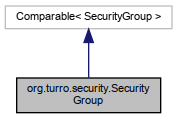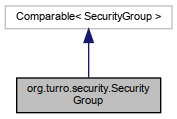◆ compareTo()
| int org.turro.security.SecurityGroup.compareTo |
( |
SecurityGroup |
o | ) |
|
Definition at line 173 of file SecurityGroup.java.
174 return Comparison.ascendant().compare(
id, o.id).get();
◆ equals()
| boolean org.turro.security.SecurityGroup.equals |
( |
Object |
obj | ) |
|
Definition at line 187 of file SecurityGroup.java.
194 if (getClass() != obj.getClass()) {
197 final SecurityGroup other = (SecurityGroup) obj;
198 return Objects.equals(this.
id, other.id);
◆ getAllowed()
| Set<AllowedGroup> org.turro.security.SecurityGroup.getAllowed |
( |
| ) |
|
◆ getId()
| String org.turro.security.SecurityGroup.getId |
( |
| ) |
|
◆ getName()
| String org.turro.security.SecurityGroup.getName |
( |
| ) |
|
◆ getRoles()
| Set<String> org.turro.security.SecurityGroup.getRoles |
( |
| ) |
|
◆ getSyndicate()
| Set<String> org.turro.security.SecurityGroup.getSyndicate |
( |
| ) |
|
◆ getTags()
| Set<String> org.turro.security.SecurityGroup.getTags |
( |
| ) |
|
◆ getType()
◆ hashCode()
| int org.turro.security.SecurityGroup.hashCode |
( |
| ) |
|
◆ isInherits()
| boolean org.turro.security.SecurityGroup.isInherits |
( |
| ) |
|
◆ loadFrom()
| static SecurityGroup org.turro.security.SecurityGroup.loadFrom |
( |
File |
file | ) |
|
|
static |
Definition at line 105 of file SecurityGroup.java.
106 try(Reader reader =
new FileReader(file)) {
107 return JsonConfiguration.read(reader, SecurityGroup.class);
108 }
catch (IOException ex) {
109 Logger.getLogger(SecurityGroup.class.getName()).log(Level.SEVERE,
null, ex);
◆ saveTo()
| static void org.turro.security.SecurityGroup.saveTo |
( |
File |
file, |
|
|
SecurityGroup |
socialGroup |
|
) |
| |
|
static |
Definition at line 114 of file SecurityGroup.java.
115 try(Writer writer =
new FileWriter(file)) {
116 socialGroup.prepareSaving();
117 JsonConfiguration.write(writer, socialGroup);
118 }
catch (IOException ex) {
119 Logger.getLogger(SecurityGroup.class.getName()).log(Level.SEVERE,
null, ex);
◆ setId()
| void org.turro.security.SecurityGroup.setId |
( |
String |
id | ) |
|
◆ setInherits()
| void org.turro.security.SecurityGroup.setInherits |
( |
boolean |
inherits | ) |
|
◆ setName()
| void org.turro.security.SecurityGroup.setName |
( |
String |
name | ) |
|
◆ setType()
◆ ACCOUNT_AUXILIAR
| final String org.turro.security.SecurityGroup.ACCOUNT_AUXILIAR ="account_auxiliar" |
|
static |
The documentation for this class was generated from the following file:



